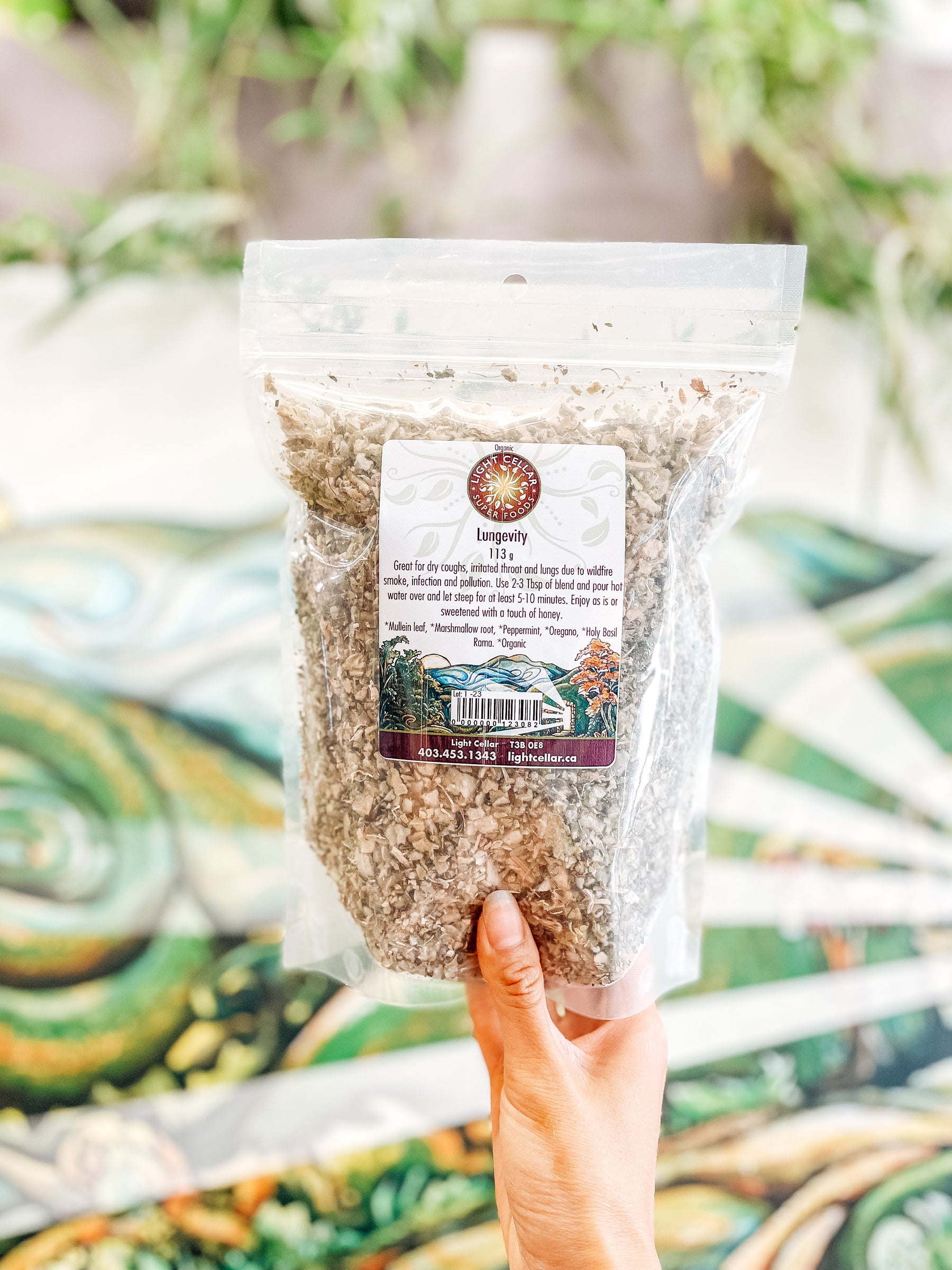

Light Cellar
Lungevity Tea Blend
Lungevity Tea Blend
113g
Light Cellar
6531 Bowness Road Northwest
Calgary AB T3B 0E8
Canada
Lungevity Tea Blend
Crafted In-House | Organic | 113g
- Demulcent
- Expectorent
- Aromatic
Demulcents support one of our natural physical and chemical immune defenses: the mucosa. When we ingest demulcents, their first direct action is on the mouth, throat, and other tissues of the gastrointestinal (GI) tract. While not often thought of as “potent” or “antimicrobial,” the gentle (and most often safe) demulcent herbs don’t have a direct effect on the immune cells. Instead, they bolster our defenses by supporting a natural barrier: healthy mucosal tissue.
Demulcents also help to thin and liquify mucus, which in turn can help support expectoration (the removal of excess mucus). This is particularly supportive in a dry cough or when there is no cough present but a feeling of the desire to cough. In these cases, mucus may be present though it is too thick, hardened, and inert to elicit a cough, or too thick and sticky to expel effectively by coughing.
Expectorant:
Expectorants can work by stimulating secretions of mucus (slightly different than demulcents, but to a similar effect) therefore adding to the volume, encouraging elimination, or supporting secretion of a thinner mucus.
They help loosen congestion in the lungs making coughing more productive and clearing the lungs.
Aromatic:
Aromatic herbs are typically those that boast spicy, minty, citrusy, or camphorous scents. This is due to small molecules that can be easily smelled and that create a bit of movement and opening in the respiratory tract when tasted or inhaled.
About the ingredients:
Mullein:
The ancient Greeks recognized the value of Mullein for lung health some 2,000 years ago. The dried leaves were traditionally used as a tea supporting pulmonary and respiratory function.
Mullein is one of the top tonic respiratory herbs (meaning you can take it long-term for respiratory support) and is both a demulcent and expectorant. It's particularly beneficial for the upper respiratory tract and has been used for asthma and dry or spastic coughs for hundreds of years.
Marshmallow root:
Marshmallow root is a true friend to the lungs, especially during times of coughing, infection, and respiratory inflammation. Marshmallow has a high content of mucilage, which is a soothing, moisturizing substance contained within the herb. Marshmallow is known as a demulcent herb, which means that it soothes and protects irritated tissue.
The roots contain more mucilage than the leave and are excellent for soothing and moisturizing an inflamed, irritated respiratory system.
Peppermint:
Peppermint can help soothe and cool hot conditions while relaxing spasms.
Oregano:
Oregano contains carvacrol and rosmarinic acid, both of which are believed to be natural decongestants and antihistamines. Because of this, Oregano is thought to be able to help maintain healthy lung function. Recent research also shows that this herb contains volatile oils that work together to support your body’s natural resistance to harmful foreign substances that can lead to respiratory issues.
Holy basil:
One of the great adaptogens to help the body in many ways, Holy Basil has been linked to better lung function and relief of asthma symptoms suggesting that holy basil may have lessened inflammation (swelling) in the airways. It also contains aromatic qualities and is considered one of the top herbs for overall health and resilience.

